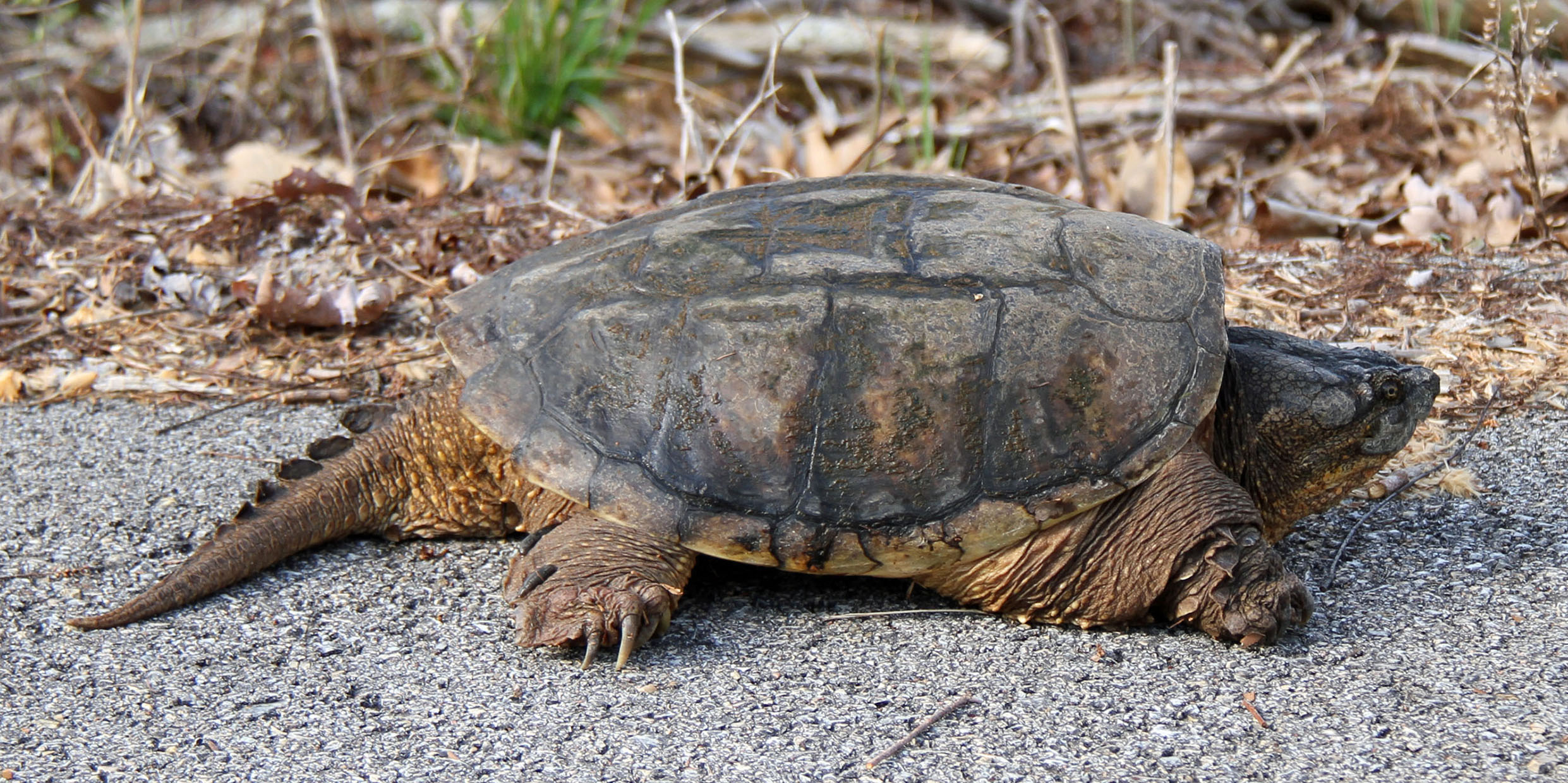Originally published 1 July 1991
If you are an early morning walker in late spring or early summer, and if your path takes you by sandy soil near a pond, and if the God of Reptiles is awake and minding his business, then you are sure to come upon a snapping turtle laying eggs.
And what a sight! This lumbering behemoth from the age of dinosaurs, this carapaced misanthrope, this nightmare-ugly Mesozoic monster, this — uh oh, I’m getting carried away.
Silence. Be still, don’t startle. She is in the midst of her preparations, spread-eagled on the sandy slope, her tail to the pond, using her hind legs to excavate a deep, flask-shaped nest.
She’s a good-sized snapper, maybe a foot from stem to stern, a thing of leather and chitin. She sees me. She casts a wary eye in my direction, but goes on about her business. I creep as close as I can get and still focus my binoculars.
And suddenly I feel abashed. I always feel abashed when I watch turtles laying. There is something intimate, intensely private about the activity. The binoculars only add to my sense of being a pondside peeping tom.
Eggs the size of fat grapes
She has almost buried herself. I scramble down the pond bank to obtain a rear-end view. And now she lays. Plop. Plop. Plop. Twenty-two leathery white eggs, the size of plump grapes, eased carefully into the hole.
An dinosaurian gum-ball machine disgorging her contents.
It is impossible to watch a snapping turtle lay without thinking of Mr. J. W. P. Jenks of Middleboro, Massachusetts.
Some older readers will know the story of Jenks’s youthful adventure, Turtles Eggs for Agassiz, told by nature writer Dallas Lore Sharp about 1910. The story has been a classic for generations, often anthologized, but now — like other antiquated tales of pluck and patience — gone sadly out of circulation.
It is worth retelling.
At the age of 23, John Whipple Potter Jenks was appointed principal of Middleboro’s Pierce Academy. One day Louis Agassiz, Harvard professor of zoology and America’s most famous scientist, appeared in the doorway of Jenks’s classroom. The great man asked for turtle eggs, for his study of turtles, part of his monumental book Contributions to the Natural History of the United States.
Jenks said yes.
The catch was this: If the proper information was to be obtained by dissection, the turtle eggs could not be more than three hours old. The distance from the pond in Middleboro where Jenks hoped to find the eggs to Agassiz’s home in Cambridge was 40 miles. And thereby hangs the tale.
On May 14, weeks before the turtles were likely to lay, Jenks began his morning vigil at the pond. There he sat, among the cedars, from 3 a.m., until the bell at the Academy announced early classes. Here is how he described those mornings, many years later, to Dallas Lore Sharp:
“What fragrant mornings those were! How fresh and new and unbreathed! The pond odors, the woods odors, the odors of the ploughed fields — of water lily, and wild grape, and the dew-laid soil! I can taste them yet, and hear them yet — the still, large sounds of the waking day — the pickerel breaking the quiet with his swirl; the kingfisher dropping anchor; the stir of feet and wings among the trees. And then the thought of the great book being held up for me!”
As he waited, day after day, Jenks came to know individually the dozen or more turtles that kept to his side of the pond. But no eggs, at least not yet. He sat and watched, Sundays and rainy days included, until finally, at the end of the second week in June, an enormous female snapper came shuffling up out of the pond.
Treasure trip
She paddled across the meadow to a sandy bank, excavated a nest, and laid her eggs. No sooner had she finished than Jenks scooped up her cache and layered them with sand into a bucket. It was 4 a.m., on a Sunday morning, and he had three hours to get his treasure to Cambridge.
I’ll not tell the rest of the story — of the wild gallop toward the Boston pike, the unexpected freight train, the frenzied hackney ride across the Charles River, the knock on the door of Agassiz’s house just as the clock strikes seven, the distraught face of Agassiz’s maid as she opens the door upon a wild young man with a bucket of sand. Suffice it to say that Jenks was acknowledged in the preface of “the great book.”
Pluck and patience. Necessary virtues if one is going to watch turtles. No other creature so big moves and acts with such deliberation. Plop. Plop. Twenty-one, twenty-two. Then the careful burial. The push and pat of the back feet. The swish of the tail, like a broom, disguising. A last suspicious glance at me. The shuffle and slide back into the pond.
It is the snapper’s deliberateness that sets her apart. And maybe that’s why I feel abashed as I watch her lay. It is not a personal intimacy that I intrude upon, but the intimacy of another age, a slower, more patient age, an age willing to wait for a month, or a hundred million years if necessary, for something to happen.



